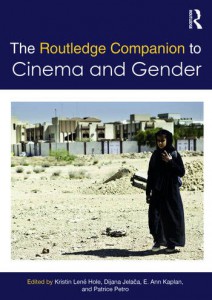The Routledge Companion to Cinema & Gender
de Kristin Hole, Dijana Jelača, E. Kaplan et Patrice Petro


Moyenne des votes : ![]()
| 0 | vote | |
| 0 | vote | |
| 0 | vote | |
| 0 | vote |
Votre vote : -
Description de l'ouvrage:
The Routledge Companion to Cinema and Gender comprises forty-three innovative essays that offer both an overview of and an intervention into the field of cinema and gender.
The contributions in this volume address a variety of geographical and cultural contexts through an analysis of cinema, from the representation of women and Islam in Middle Eastern film, and female audience reception in Nigeria, to changing class and race norms in Bollywood dance sequences. The book includes a special focus on women directors in a global context, examining films and filmmakers from Asia, Africa, Australia, Europe, and North and South America.
Alongside a comprehensive overview of feminist perspectives on genre, this collection also offers discussion on a range of approaches to spectatorship, reception studies, and fandom, as well as transnational approaches to star studies and the relationship between feminist film theory and new media. Other topics include queer and trans* cinema, ecocinema, the post-human, and the methodological dimensions of feminist film history.
This Routledge Companion provides researchers, students, and scholars with an essential guide to the key political, cultural, and theoretical debates surrounding cinema and gender.
À propos des auteurs :
Kristin Lené Hole is an Assistant Professor in the School of Film at Portland State University, USA. She is the author of Towards a Feminist Cinematic Ethics: Claire Denis, Emmanuel Levinas, and Jean-Luc Nancy (2016) and co-author (with Dijana Jelača) of Film Feminisms: A Global Introduction (2019).
Dijana Jelača teaches in the Film Department at Brooklyn College, USA. She is the author of Dislocated Screen Memory: Narrating Trauma in Post-Yugoslav Cinema (2016) and co-author (with Kristin Lené Hole) of Film Feminisms: A Global Introduction (2019).
E. Ann Kaplan is Distinguished Professor of English and Women’s, Gender and Sexuality Studies at Stony Brook University, USA, where she also founded and directed The Humanities Institute. She is Past President of the Society for Cinema and Media Studies. Kaplan’s pioneering research on women in film includes Women in Film: Both Sides of the Camera, Motherhood and Representation, Looking for the Other, and Feminism and Film. Her recent research focuses on trauma: see Trauma and Cinema (2004) with Ban Wang; Trauma Culture: The Politics of Terror and Loss in Media and Literature (2005); and Climate Trauma: Foreseeing the Future in Dystopian Film and Fiction (2015). Patrice Petro is Dick Wolf Director of the Carsey-Wolf Center, Professor of Film and Media Studies, and Presidential Chair in Media Studies at the University of California, Santa Barbara, USA. She is the author, editor, and co-editor of twelve books, most recently Idols of Modernity: Movie Stars of the 1920s (2010), Teaching Film (2012), and After Capitalism: Horizons of Finance, Culture, and Citizenship (2016).
Voir le site internet de l'éditeur Routledge
> Des mêmes auteurs :
Global Cities (2003)
Cinema, Architecture, and Urbanism in a Digital Age
Dir. Patrice Petro et Linda Krause
Sujet : Economics
Joyless Streets (1989)
Women and Melodramatic Representation in Weimar Germany
> Sur un thème proche :
Shifting Gender Identities in Popular Culture (2025)
Essays on Representation Since 2010
Dir. Laura J. Getty et Josef Vice
Sujet : Sociology
Gender and Genre in 1990s Hollywood (2024)
Challenging Definitions of Sex, Women, and Femininity
Sujet : Sociology
Searching for Feminist Superheroes (2024)
Gender, Sexuality, and Race in Marvel Comics
Sujet : Sociology
Distancing Representations in Transgender Film (2023)
Identification, Affect, and the Audience
Sujet : Sociology
The Limits of #MeToo in Hollywood (2021)
Gender and Power in the Entertainment Industry
Sujet : Sociology
Toxic Masculinity (2020)
Mapping the Monstrous in Our Heroes
Dir. Esther de Dauw et Daniel J. Connell
Sujet : Sociology
Wonder Women and Bad Girls (2020)
Superheroine and Supervillainess Archetypes in Popular Media
Sujet : Sociology